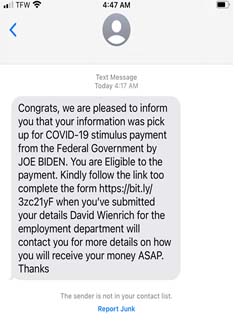Date: August 30, 2021
Contact: newsroom@ci.irs.gov
WASHINGTON — The Internal Revenue Service received a record number of reports about Economic Impact Payment scams in June and July 2021.
"Even though taxpayers have received multiple rounds of Economic Impact Payments, we saw phishing scams surge this summer," said Jim Lee, Chief of IRS Criminal Investigation. "The number of reported scam attempts reached levels we haven't seen in more than a decade. More than ever, it is important for taxpayers to continue to protect their personal information and not fall victim to these scams."
Phishing scams attempt to mirror legitimate IRS communications with the goal of convincing unsuspecting taxpayers to enter personal information or submit a payment. This information is then exploited by scammers.
Recent scam reports include:
- Text messages stating that a taxpayer is eligible for a "stimulus payment" and they must click on a link to complete the necessary information to claim it.
- Phishing emails claiming the IRS has calculated a taxpayer's "fiscal activity" and they are eligible for an Economic Impact payment in a specific amount.
Although criminals are constantly changing their tactics, taxpayers can help protect themselves by acting as the first line of defense. The best way to avoid falling victim to a scam is knowing how the IRS communicates with taxpayers. The IRS does not send unsolicited texts or emails. The IRS does not threaten individuals with jail or lawsuits, nor does it demand tax payments on gift cards or via cryptocurrency.
Taxpayers should be on the lookout for grammatical, capitalization and spelling errors in emails and texts, which serve as fraud indicators. Taxpayers should also exercise caution when clicking shortened URLs, which can lead to fraudulent web pages.
Taxpayers who receive unsolicited emails or social media attempts to gather information that appear to be from either the IRS or an organization closely linked to the IRS, should forward the message to phishing@irs.gov. Taxpayers are encouraged not to engage potential scammers online or on the phone.
Taxpayers can report fraud or theft of their Economic Impact Payments to the Treasury Inspector General for Tax Administration (TIGTA). Reports can be made online at TIPS.TIGTA.GOV.
If you suspect you are a victim of identity theft as a result of a scam, visit the Taxpayer Guide to Identity Theft webpage to know what steps to take.
To learn more about COVID-19 scams and other financial schemes, visit IRS.gov. Official IRS information about COVID-19 and Economic Impact Payments can be found on the Coronavirus Tax Relief page, which is updated frequently.


